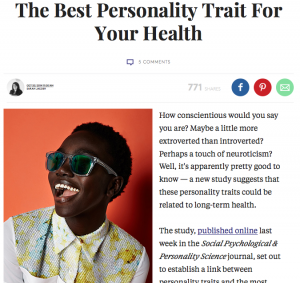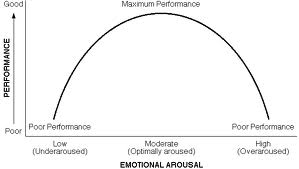“What is the grandmother statement?” My undergraduate thesis advisor used to ask this a lot during lab meetings. He emphasized that psychological research should be presented in a way such that anyone could effectively understand your research goals and findings without a great deal of scientific knowledge (i.e. the nonacademic community).
I bring this up because psychological research found in the presses is often sensationalized. It is being communicated on a variety of media sources from the New York Times to the New York Magazine with catchy titles like, “Why Myer-Briggs is Totally Useless—but Wildly Popular”, “The Best Personality Trait for Your Health” or “When Introverts Should Avoid Coffee”. Who can resist clicking on titles like that! While I do appreciate these creative efforts, the body of the articles occasionally falls short of the title. In the process of communicating the “grandmother statement” of the research, the journalist engages in over-simplification, over-generalization, and under-specification of the limitations of the study or nuances of the research design.
For example, “When Introverts Should Avoid Coffee” addresses a passage about the differential effects of caffeine on introverts and extroverts from psychologist Dr. Brian Little’s new book, Me, Myself, and Us: The Science of Personality and the Art of Well-Being. The summary finding is that caffeine may hinder the performance of introverts because, in comparison to extroverts, their baseline arousal level is higher.
A satisfactory answer to “why” is not given in this article. The journalist’s interview with Dr. Little focuses on the coffee statement itself rather than a deeper elaboration on the fundamental research supporting it. For the record, Dr. Little briefly explains German psychologist Hans Eysenck’s theory of extroversion. However, the article itself does not go on to mention that the theory rests on the inverted U theory of arousal by Yerkes and Dodson.
Optimal performance occurs when the performer reaches an optimal level of arousal. Dr. Little mentions that the passage in his book was based off of research by Dr.William Revelle of Northwestern University. However, the journalists do not provide additional information about Dr. Revelle’s work, including details about the original study that evaluated the effects of coffee among introverts and extroverts on a verbal test (Revelle, Amaral, Turriff, 1976). This in turn oversimplifies Dr. Revelle’s research. Of note, Revelle’s subsequent work has revised this simple relation—the time of the day, stage of practice interacts with personality dimension to affect performance (for example, Revelle, Humphreys, Simon, & Gilliland, 1980). Note that this article may simply be a condensed version of the actual interview between the researcher and the journalist. The source (Dr. Little’s book) is certainly replete with evidence backing recommendations for ideal caffeine consumption for the introvert. But whether it be due to space constraints or the targeted audience, the journalist does an incomplete job in communicating the research.
Now understandably, a lay reader may have neither the access nor the desire to further research a psychological finding that is printed in the popular press. However, that is not to say that readers should begin to recognize reliable sources of psychological science. When reading articles from popular media sources, see whether or not the original source is being cited. Did the journalist interview other researchers not involved in the project to evaluate their views on the work? Is the journalist prescribing recommendations for the reader? Remember that most analyses are done on a group level and cannot be entirely generalized on an individual basis. Who is the author of the article—does the reporting journalist have a background in science? Psychologists should not be timid in correcting fallacies! Discussions from the online community are often fueled by commentary and the like.
Critical thinking should not be left in the lab or the lecture hall but should be a skill we take into our everyday lives. This is incredibly important for being an informed reader in a variety of topics. As psychologists, we should also take initiative to correctly inform the larger community and be mindful in creating grandmother statements that do not deviate too far from the truth.
—–
Revelle W, Amaral P, Turriff S. (1976). Introversion/extroversion, time stress, and caffeine: effect on verbal performance. Science. 192(4235):149-50.
Revelle W, Humphreys MS, Simon L, Gilliland K. (1980). The interactive effect of personality, time of day, and caffeine: a test of the arousal model. J Exp Psychol Gen. 109(1):1-31.
Yerkes RM, Dodson JD. (1908). “The relation of strength of stimulus to rapidity of habit-formation”. Journal of Comparative Neurology and Psychology18: 459–482. doi:10.1002/cne.920180503.


